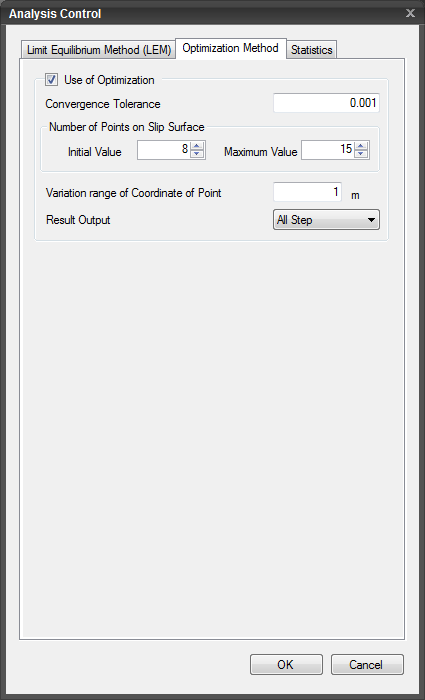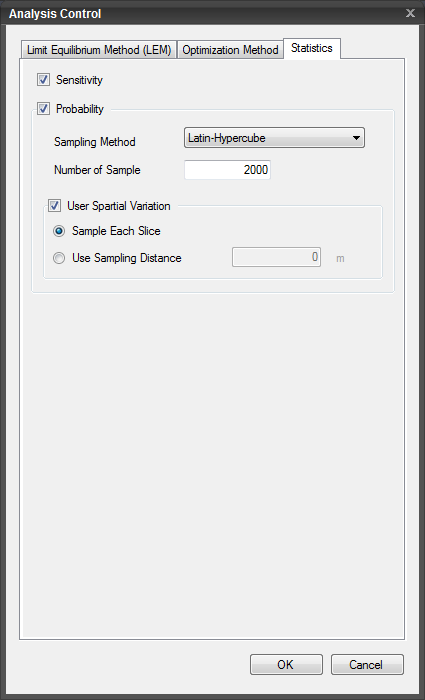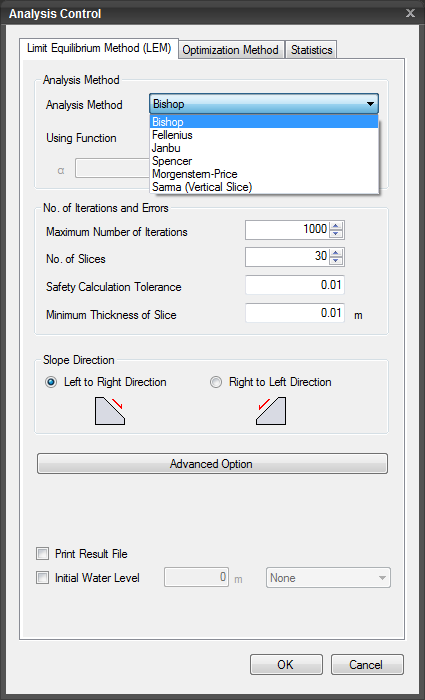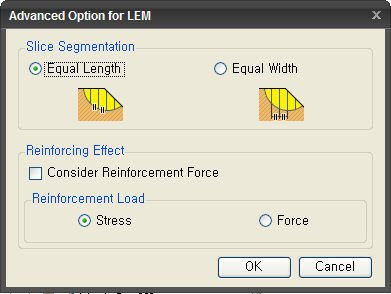Limit Equilibrium Method (LEM)
Create Control Data for Slope Stability Analysis.
Applicable Modules:
Ground |
Slope |
Soft Ground |
Foundation |
Seepage |
Dynamic |
From
the Main
Menu, select Analysis
| Design > Design and Report > Analysis Case > Slope
Stability (LEM) Analysis > Analysis Control Data
![]()
Limit Equilibrium Method (LEM)
Limit Equilibrium Method is used to carry out Slope Stability Analysis.
Analysis Method
Bishop
Fellenius
Janbu
Spencer
Morgenstern - Price
Sarma (Vertical)
Using Function
In case of Morgenstern - Price method, it is to calculate the vertical force of slice using function
Half
Sine is default one. Refer to LEM
User Defined Function.
< Limit Equilibrium Method (LEM) >
α / β
In case of Sarma method, the relation between horizontal and vertical force of slice is defined by Mohr-Coulomb failure criteria.
X = λ x ( αh + Etanβ )
α : cohesion
β : friction angle
h : slice height
No. of Iterations and Errors
Maximum number of iterations
Maximum number of iterative calculations.
No. of Slices
Number of slices to be assumed at the failure surface.
Safety Calculation Tolerance
Convergence criterion for safety factor.
Minimum Thickness of Slice
Minimum thickness of failure surface.
Slope Direction
Select the direction of Analysis model.
Left to Right Direction
Sloping down from left to right.
Right to Left Direction
Sloping down from right to left.
Print Result File
Calculation results for all of assumed failure surfaces.
Initial Water Level
Enter the underground water level condition. A function created by a basic function or the Water Level Function can be specified.

Use of Optimization
If checking the button 'Use of Optimization', the below options about optimization method is activated and optimization analysis to find critical slip surface is conducted.
Convergence Tolerance
Specify optimization convergence tolerance. When analyzing in order to find critical slip surface, optimization is quitted if difference between factor of safety of slip surface divided before and factor of safety of slip surface divided currently is less than or equal to convergence tolerance.
Number of Points on Slip Surface
Specify initial value and maximum of points on slip surface. Optimization is conducted increasing the number of slip surface from initial value to maximum value.
< Define Optimization analysis >
Variation range of Coordinate of Point
Specify variation range of coordinate of point on slip surface.
Result Output
Specify method of result output. If selecting 'Last step', result of last step which is the lowest factor of safety is output, and if selecting 'All step', results from each slip surface are output.

Sensitivity : Check sensitivity analysis. But, It can not be considered with optimization analysis at the same time.
Probability : Check probability analysis. But, It can not be considered with optimization analysis at the same time.
- Sampling Method : Latin-Hypercube method. (Refer to analysis manual)
- Number of Samples : Enter the number of samples.
User Spatial Variation : Define spatial variation directly.
- Sample Each Slice : Calculate parameters of each material defined about probability analysis applying each slice of fracture surface differently.
- Use Sampling Distance : Calculate parameters of each material defined about probability analysis applying on the standard of distance coordinates each slice base of fracture surface differently. Enter sampling distance and apply based on the most left coordinates from total slope surface.
Click ![]() , after applying the selected Analysis case, the dialog box will
close upon clicking.
, after applying the selected Analysis case, the dialog box will
close upon clicking.
Click
![]() or press the ESC
key to close the dialog box.
or press the ESC
key to close the dialog box.

